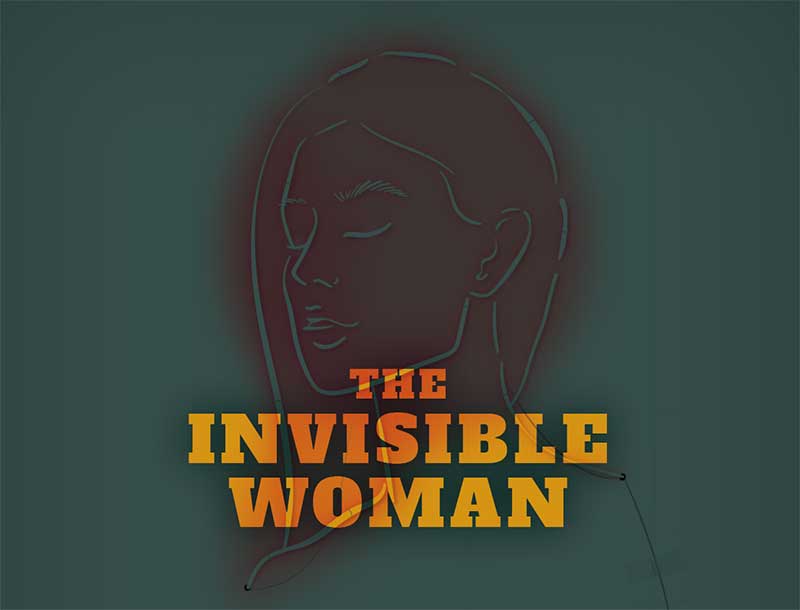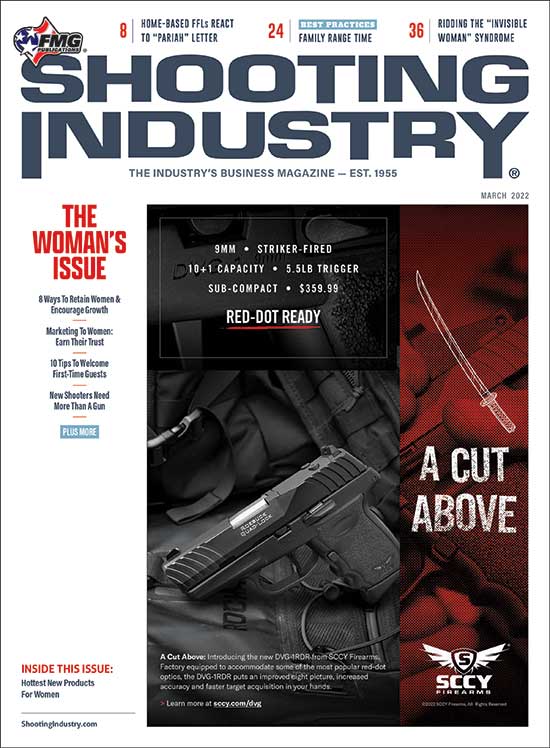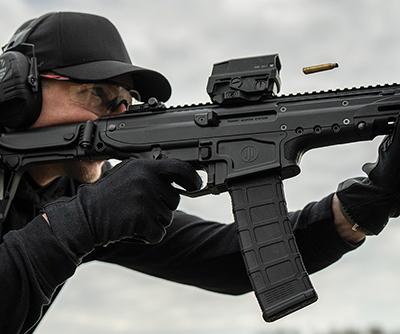The Invisible Woman
It was summer 2018. In my usual unassuming sweatpants and T-shirt, I strolled into the impressive pro shop of a well-stocked, well-staffed, modern, indoor shooting range just outside of Nashville, Tenn. I had never been to this range before, but I had heard nothing but great things about it. With state-of-the-art equipment, multiple ranges and training rooms, indoor rifle lanes, and every kind of handgun and long gun known to humankind, it was quite the candy store!
The staff members were easily identifiable by their matching branded polo shirts. One walked by me and gave a quaint Southern smile. Another made eye contact and tipped his chin. Both were acknowledging me on their way to other customers who had come in behind me. A few more staff members stood behind glass showcases and stared beyond me as if they hoped I wouldn’t expect their service. A few minutes passed. Then 10. Then 15. I stood there, in the middle of the pro shop, while at least a half-dozen workers declined to offer me any assistance beyond a passing nod.
Finally, an employee approached me with a kind glow and said, “Hi, I’m [she told me her name], how are you today?” After pleasantries she asked, “Has anyone helped you yet?” I was so glad she asked. “Actually, I’ve been here 15 minutes and not one person approached me until you did.” She was genuinely disappointed and apologized to me profusely. She took great care of me, and since that day she’s been my go-to person whenever I do business there.
Was It Me?
So, what was it that rendered me invisible or unapproachable to the rest of the staff? Was it my casual dress? My youthful face? My chubby stature? Did I strike them as a scanty spender or noncommittal browser? A loiterer? I can’t be sure.
But there was one noticeable difference between me and every other customer in the pro shop: I was a woman, and they were all men. Likewise, there was one apparent difference between the staff member who approached me and the six or seven others who didn’t bother: She was a woman, and they were all men.
I’ll never know for sure why those workers declined to engage me as a customer. This is merely an anecdote — one isolated, atypical experience that unfortunately now occupies a permanently disproportionate space in my memory.
But I’m not alone. Ask any experienced shooter with two X chromosomes and the chances are high she’s had a similar experience at least once or twice. Women often share familiar chuckles over those all-too-familiar moments of feeling wholly unnoticed by gun-store salesmen.
It takes many forms: everything from being utterly ignored to being aggressively pitched a pink bedazzled J-Frame. Those two extremes — and all manner of missteps in between — are just different manifestations of being the invisible woman.
An Important Vantage Point
Gun-store workers might read this and think, I’ve never done anything to make female customers feel unwelcome. And it could be 100% true. Here’s the limitation of this perspective: it’s business-centric instead of customer-centric. In other words, does your response include much effort to walk in the customer’s shoes? Or does it instead prioritize defending the gun store?
As Chris Norville said when I asked him about preventing invisible woman syndrome, “The trainers and retail employees have to remember it’s all about the customer’s needs, not yours. When I’m helping a customer, I can’t view the transaction through my own personal lens. I’ve got to do my best to approach it from the customer’s vantage point.”
Norville is director of training at On Target Shooting Sports in Murfreesboro, Tenn. Putting Norville’s insight into context, I’m guessing he would not unilaterally assume a woman wants a 2″ sparkly revolver. If it’s what she wants, she can say so. And if gun-store workers engage her the same way they would any other paying customer, eventually she’ll do exactly that.
”There was one noticeable difference between me and every other customer in the pro shop: I was a woman, and they were all men.“
Will Dougan is director of training at Top Gun Academy in Memphis, Tenn. Rarely does he mince words. I asked Dougan about women feeling invisible in gun stores. His response was matter of fact: “I’ve found when you treat women like people, they respond well.”
I’m not sure it has to be any simpler or any more complicated.
But what does this look like in practice? What do we mean by “treating women like people”? Is it just an empty platitude, or might it require a few tweaks to standard practices at the gun counter?
For those who like lists and concrete examples, here are five tips for firearms retailers and trainers hoping to rid their facilities of invisible woman syndrome.
1. Don’t suggest a gun for her.
“I know just what’ll work for you …” “I’ve got the perfect gun for you right over here …” “Here’s what most of my female customers are buying …” Nope, nope, nope. These approaches are easy to take and are usually well intended. However, nothing could be more dishonest than purporting to know what’s perfect for a person you just met two seconds ago.
If you know what equipment she needs within the first few moments, you’ve made some unwarranted assumptions. In so doing, you might have just insulted her by implying you know her better than she knows herself. At best, it could cost you the sale; and at worst, you’ve lost her as a customer forever.
And if she’s a newcomer or a hesitant or fearful entrant into the gun-owning community, then by making her decisions for her, you might have unwittingly dispossessed her of the very agency and autonomy the Second Amendment was codified to safeguard. How’s that for irony?
A much better approach is to ask questions. If she’s shopping for a gun, ask her what she plans to use it for. How often does she plan to practice? Has she taken any classes? Does she plan to carry? Or is it for home defense? Or for sport shooting? Or hunting? If she’ll be carrying the gun, what are her daily activities? If your shop offers rental guns, have you suggested she rent a few guns before purchasing one?
Try to ascertain her needs, not your own preferences. Even if she has no idea what she wants, help her make her own decision by asking questions rather than just presumptively imposing a solution before you’ve confirmed what issue she’s trying to solve.
”Women often share familiar chuckles over those all-too familiar moments of feeling wholly unnoticed by gun-store salesmen.“
2. Don’t just point to the “women’s stuff.”
“We just got in a huge shipment of gun purses …” “This model comes in lots of different colors …”
These are more examples of retailers unintentionally applying the “since you’re a woman” filter. Why sell a customer only a small fraction of your inventory?
Instead, keep asking her questions until you get a sense of what she likes, wants and needs (see the previous tip). If she wants a pink bedazzled revolver stashed in a shoulder-slung Coach knock-off, okay, fine. Invite her to explain what brought her into the store in the first place — you might be surprised to learn there are far more options to offer her than “women’s stuff.”
3. If she’s the customer, don’t focus on her male companion.
“So, has she ever fired a gun before? Does she want a semi-auto or a revolver?” Um, hello. She is standing right there and is perfectly able to speak for herself. This phenomenon baffles me. Women often enter gun stores accompanied by a brother, a boyfriend, spouse or a father figure — especially if it’s her first time purchasing a firearm.
In those instances, it’s easy for the salesperson to engage with the male companion rather than with the woman herself. Resist temptation. Even if the woman seems reserved or deferential to her male companion, or if companion dominates the conversation, please do your best to steer the focus back to the customer: in this case, the woman.
Make eye contact with her. Speak directly to her rather than to her companion. Even if she says something like, “Well, I’ll take whatever he thinks I should have,” see if you can gently coax her into offering some insight on her own wishes. Remind her this purchase is as personalized as buying a new car or a new pair of shoes, and she’s the only one who can decide what’s best for her.
4. During live-fire training, separate her from her male companion.
This one often gets overlooked and might be counterintuitive. Any time my training partners and I have open-enrollment classes, we always assign everyone’s placement on the firing line, and we always deliberately separate spouses.
Why? Because people are competitive, and negative peer pressure is strongest among those we know personally. Having a person take her first shots in a training class while standing right next to her spouse can be nerve-wracking (and in some cases, intimidating). So, we try to position students so they don’t have the added pressure of knowing their spouse is staring at them while they learn how to shoot.
5. Represent women positively in your establishment.
This one should go without saying, but be as proactive as possible about representing women in a positive light. Sell books by respected women authors. Display posters featuring decorated competitive shooters who are women. Collect and showcase testimonials from your regular female customers — preferably with photos or video. Hire competent female salespeople and trainers and invest in their professional development. Don’t let them be the token girl employees just to “check the box.”
Promote qualified women to leadership positions, send them to tradeshows and other events to represent your brand and remove any obstacles to their success. And please … please take down the “gun bunny” posters of scantily clad pin-up models draping themselves over tanks and Gatling guns.
Reach A Broader Audience
These are just five things, but there are countless ways to be proactive about rolling out a proper welcome mat for women in your store. The most difficult part is there’s no single correct answer. Women aren’t a monolith any more than men are. (Frankly, some women might love seeing the pin-up model I just suggested you remove.) But the tips here aren’t about satisfying everyone — that’s impossible. Instead, all we can hope to do is reach the broadest possible audience.
If the majority of women can shed the invisibility cloak when they walk through your door, then you’re not only boosting the bottom line, but also helping ensure the Second Amendment is safe for untold future generations of Americans, regardless of gender.
Tiffany Johnson is a licensed attorney, freelance legal writer and offers web design services through her website, FrontSightPress.com. Johnson is also an NRA Training Counselor and teaches handgun classes with Citizens Safety Academy in Tennessee.





